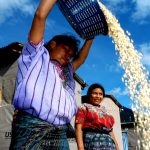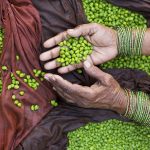On March 8, 2017, the world celebrates International Women’s Day. To understand women’s role in agriculture and to close the gender gap in agricultural production, IFPRI's research has been examining gender differences within rural households and communities for over 25 years.
Building Capacity for Strategic Policies and Investments in Latin America and the Caribbean
Ineffective investments and policies can be partly attributed to limited information. To help policy makers in Latin America and the Caribbean make informed decisions, IFPRI has used its research and economic modeling expertise to develop region-specific tools that enhance policy makers’ access to data, analyses, and trends. Peru has enjoyed sustained periods of economic growth >> Read more
Advancing Cutting-Edge Nutritional Interventions in Latin America
IFPRI's work continued to promote improved nutrition in Latin America through innovative evaluations and programs. From 2011 to 2016, IFPRI, in collaboration with Mercy Corps and with support from the United States Agency for International Development (USAID), designed and evaluated the Programa Comunitario Materno Infantil de Diversificación Alimentaria (PROCOMIDA)—a nutrition program aimed at improving the health and >> Read more
Cultivating Effective Nutritional Interventions in Latin America and the Caribbean
One of IFPRI’s earliest nutrition projects in Latin America and the Caribbean examined food-assisted maternal and child health and nutrition programs in Haiti. Traditionally, these programs administered nutritional interventions to children under five years of age only after they became undernourished—the recuperative approach. Although new scientific evidence was surfacing that children under two years of >> Read more
Designing Social Protection Programs in Latin America Using Evidence
The mid-1990s economic crisis in Latin America threatened to sharply increase poverty and left many people vulnerable. In response, governments in Latin America developed and implemented innovative social protection programs in the form of conditional cash transfers (CCTs). To examine the impact of these programs, several governments called on IFPRI to conduct rigorous evaluations. IFPRI’s >> Read more
Responding to Floods in Bangladesh
In 1998, Bangladesh was hit by "the flood of the century." Policy makers sought ways to make food more readily available in the short term and to better manage public food grain stocks in the future.Responding to the government’s need for timely, practical policy analysis in the midst of the floods, IFPRI staff members and collaborators from the Food Planning and Monitoring Unit of the Ministry of Food and Disaster Management produced 53 policy advisory memos from 1998 to 2001. These memos offered ready input into current policy decisions needed to respond to the impacts of the flooding.
Advancing Educational Performance through Food Rations
The Working Group on Targeted Food Interventions, which was chaired by IFPRI, introduced the concept of the Food for Education program in August 1992, through which families were given food in exchange for their children’s continued attendance in school. This innovative idea was endorsed by the World Bank as a promising approach. In 1993, the Bangladeshi government introduced a pilot Food for Education program based on the recommendations from IFPRI and its partners. It used the savings accumulated from terminating the Palli Rationing Program for a more effectively targeted, food-based intervention.
Improving Public Food Distribution in Bangladesh
In response to natural disasters and crop failures that caused food shortages in the 1990s and 2000s, the World Food Programme (WFP) and other donors supplied food for the Government of Bangladesh to distribute. However, with growing concerns that food aid was not reaching the most vulnerable, WFP called on IFPRI in 2003 to examine the source of food aid "leakages."
Leveraging Agriculture for Nutrition in South Asia (LANSA)
Agriculture is the primary livelihood for nearly half the population of South Asia, and yet its potential to reduce undernutrition remains unrealized. One-third of children in South Asia are stunted. Despite increasing political will to improve nutrition, evidence has been sparse on how agriculture and agrifood systems can be better designed to improve nutrition. In 2012, a research consortium called Leveraging Agriculture for Nutrition in South Asia (LANSA) was formed among the Collective on Social Science Research in Pakistan, BRAC, the Leverhulme Centre for Integrated Research on Agriculture and Health (LCIRAH), the Institute of Development Studies (IDS), and IFPRI, under the leadership of the M.S. Swaminathan Research Foundation and with support from UK's Department for International Development (DFID). The aim was to generate evidence to strengthen the nutrition sensitivity of agrifood systems in Afghanistan, Bangladesh, India, and Pakistan.
HarvestPlus: Addressing Nutritional Challenges through Zinc Rice
In Bangladesh, 41 percent of children under five are estimated to be zinc deficient according to the Bangladesh Demography Survey, and the country loses over US$700 million in gross domestic product due to vitamin and mineral deficiencies according to the World Bank. Faced with such deficiencies in nutrition and productivity, HarvestPlus, in partnership with the European Commission and the IFPRI-led CGIAR Research Program on Agriculture for Nutrition and Health (A4NH), worked closely with the Bangladesh Rice Research Institute (BRRI), the International Rice Research Institute, and 30 other partners to develop three rice varieties fortified with zinc.
- « Previous Page
- 1
- …
- 4
- 5
- 6
- 7
- 8
- …
- 22
- Next Page »










